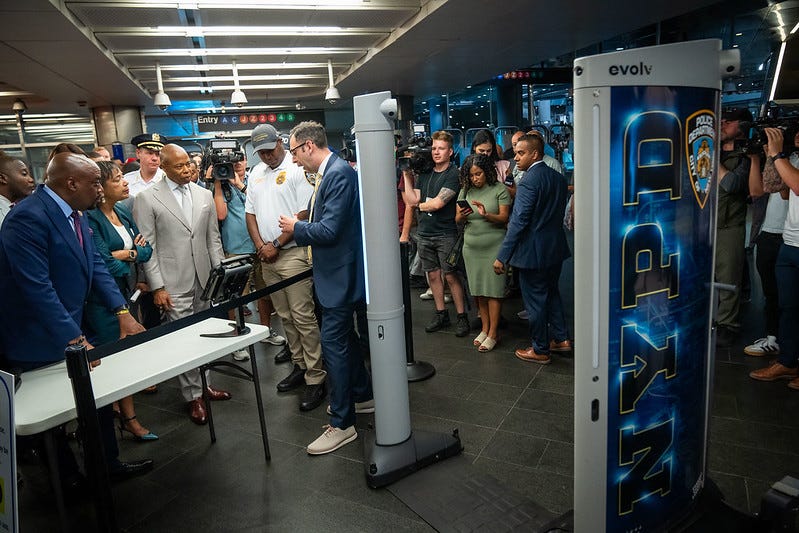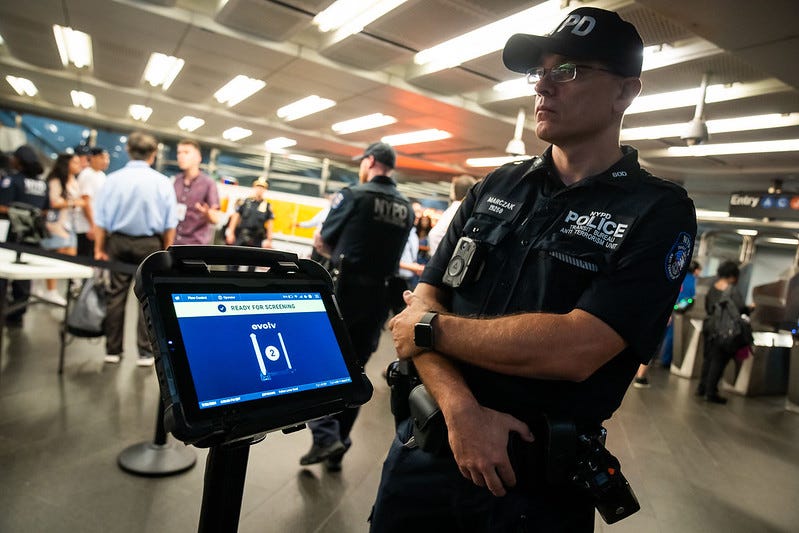
NEW YORK (1010 WINS/WCBS 880) — Friday was the official launch of a New York City pilot program that will attempt to make the subway system safer by scanning riders for weapons, and civil liberties groups have already begun preparing litigation against the measure, asserting that the technology violates New Yorkers’ Fourth Amendment rights.
Mayor Eric Adams and NYPD officials addressed concerns about the technology, which was first previewed in March, on Friday afternoon at lower Manhattan's Fulton Center subway station, the site of the first scanner installment.
According to the mayor, the technology can detect if someone is carrying a gun, and where that gun is on a person’s body.
“We’re going to protect our riders, and this is not typical law enforcement,” Adams said. “This is to add on to and leverage technology to prevent shootings in our subway, and this is about preventing mass casualty incidents.”
Riders identified at random must go through the scanner or have their bag checked, officials said. It could be every tenth, fifteenth or twentieth person, as the count will vary.
The program has raised concerns at the New York Civil Liberties Union and Legal Aid Society, with the organizations releasing a joint statement that they plan to bring City Hall and the MTA to court to answer for its “unconstitutional surveillance.”
“New Yorkers did not consent to give up their rights or be NYPD guinea pigs for over-hyped and error-prone surveillance tech,” the statement read. “We are prepared to protect the right of all subway riders to be free from NYPD intrusion and harassment.”
When confronted with criticisms of the scanners’ constitutionality, NYPD Deputy Commissioner of Legal Matters Michael Gerber cited a Fourth Amendment doctrine allowing for select searches.
“There’s an entire special needs doctrine under the Fourth Amendment, which really is talking about this type of scenario, doing what we’re doing in order to keep people safe and in particular to prevent shootings on subways,” Gerber said. “That’s the kind of thing the special needs doctrine is meant for.”

Gerber and other city officials also noted that straphangers are welcome to decline the scan—as long as they then exit the subway system.
“If they opt to decline, like ‘Hey, I don’t want to go through the machine, I don’t want to get wanded,’ no problem,” said NYPD Chief of Transit Michael Kemper. “There’s nothing wrong with that. They just will not be allowed entry into the subway system.”
Authorities focused on the historic dip in the subway daily crime rate—currently at a 14-year low—as a reason to double-down on preventative security measures, while the NYCLU and LAS cited it as a reason that the “unlawful technology” was unnecessary.
A study of the scanners at NYC Health + Hospitals/Jacobi in the Bronx found that in 2022, 85% of scanner alarms were false positives. The NYCLU and LAS said that the scanners are also prone to flag items that are not illegal, like laptops.
“We’re talking about putting scanners that are susceptible to false positives into a system that millions of individuals utilize every day,” LAS attorney Jenvine Wong told 1010 WINS.
Gerber pushed back against these claims, stating that while he cannot say the technology is perfect, internal testing has found it “quite accurate.”
“We did lots of testing. And this testing again on members of service or in internal testing,” Gerber said. “And we believe that the technology as we’re deploying it is going to be quite accurate.”
The devices will be deployed over the next month at select subway stations across the city, though officials did not specify which.
“If you would speak to the average subway rider, they would state they don't want guns on their system,” Adams said. “And if it means using scanners, then bring the scanners on.”
Daniel Lambright, senior staff attorney at the NYCLU, disagrees.
“We should not have a society where everyone is treated as a suspect. Where everyone is constantly surveilled by the government,” Lambright told 1010 WINS.
